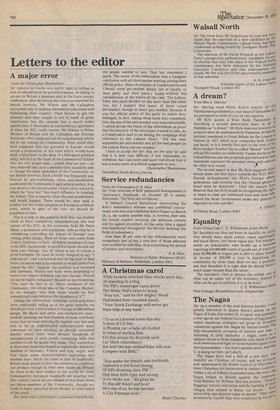A major error
From Sir Christopher Masterman.
Sir: General de Gaulle was surely right in telling us that we should never be good Europeans. In failing to secure for Britain a separate seat in the Paris energy conference, after declaring that this was essential for British interests, Mr Wilson and Mr Callaghan succeeded only in-making themselves ridiculous and humiliating their country. Their failure to get the separate seat they sought is not in itself of great importance, but the episode has a much wider significance. It illustrates an extraordinary ignorance of what the EEC really means. Mr Wilson is Prime Minister of Britain and Mr Callaghan the Foreign Secretary, who conducted all the negotiations which led to our joining the Community. How could they have supposed that our partners in Europe would accept a proposition of this kind which would have dealt a fatal blow to the ideal of a EuroPean political unity, which is at the heart of the Community? Either they are very stupid men — which they are not — or they believed that once a member they would be able to change the basic principles of the Community to • suit British interests. Such a belief was frequently put forward by pro-marketeers when anti-marketeers questioned the Community's agricultural policy. It is now shown to be unwarranted. I know of no school in which the new boy" has much influence in running the school. This is exactly what the anti-marketeers said would happen. There would be, they said, a gradual but inevitable progress to European political unity, which in spite of the veto we should be powerless to halt.
Nor is it only in the political field that our leaders seem to have completely misunderstood the real nature of the EEC. In the economic field Mr Peter Shore, a prominent anti-marketeer, tells us that he is considering controlling the import of 'foreign' cars among other, things. Most of these cars come from France, Germany or Italy, all fellow members of ours in the EEC. Incidentally no good European should call these cars 'foreign,' but Mr Shore is not of course a good European. He must be sorely tempted to say "I told you so", and it is ironical that he has now to deal with a situation which he warned us would arise if we joined the EEC. Suppose the position was reversed and Germany. France and Italy were proposing to restrict the import of British cars into Europe. Should we not be highly indignant? Should we not be saying, "You can't do that to us, fellow members of the Community; the whole idea of the Common Market, so we thought, was that there would be free unrestricted trade between the members of it"?
During the referendum campaign pro-marketeers were continually telling us of the great benefits we should get from a free market in Europe of 300 million people. Mr Shore and other anti-marketeers countered by pointing out that freedom of trade cuts both ways; that we were entering the market very late and that so far as sophisticated manufacturers were concerned we were entering an already saturated market where there were already hundreds of manufacturers of such goods competing with one another to sell the goods they made. They warned us in short that those who hoped to capture the domestic markets of Germany, France and Italy might well find these same manufacturers capturing our, markets here. Much the same is true of foodstuffs. Britain must import to live; the continental countries can produce enough in their own countries. Britain for them is the best market in the world for food. Consequently European foodstuffs are pouring into this country, which we are obliged to buy from these., our fellow-members of the Community, though , we could in many cases buy more cheaply in other parts of the world. the people wanted to join. That last statement I query. The result of the referendum was a foregone conclusion with all three parties making joining their official policy. Many thousands of Conservatives and Liberals voted pro-market simply out of loyalty to their party and their party's leader without any consideration of the merits of the case. The Labour Party was more divided on the issue than the other two, but I suspect that many of them voted pro-market, though at heart anti-market, because it was the official policy of the party to which they belonged. In fact, taking these facts into consideration, the size of the anti-market vote was remarkable. I cannot accept the result of the referendum as proof that the majority of the electorate wanted to join. As a Conservative said to me during the campaign with reference to the Labour Party, "All the best arguments are anti-market and all the best people (in the Labour Party) are pro-market."
I have to accept the fact that we are now 'in' and that it is now very difficult, if not impossible, to withdraw. but I am more and more convinced that it was a major error of political judgment to join.
Christopher Masterman Homefield, North Bovey,.Devon


































 Previous page
Previous page